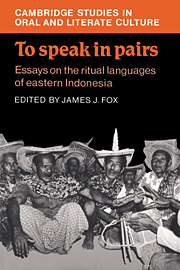Book contents
- Frontmatter
- Contents
- Illustrations
- The contributors
- Acknowledgements
- Introduction
- 1 Etiquette in Kodi spirit communication: the lips told to pronounce, the mouths told to speak
- 2 Method in the metaphor: the ritual language of Wanukaka
- 3 Li'i marapu: speech and ritual among the Wewewa of west Sumba
- 4 The Pattern of Prayer in Weyéwa
- 5 Fashioned speech, full communication: aspects of eastern Sumbanese ritual language
- 6 Manu Kama's road, Tepa Nilu's path: theme, narrative, and formula in Rotinese ritual language
- 7 The case of the purloined statues: the power of words among the Lionese
- 8 The journey of the bridegroom: idioms of marriage among the Endenese
- 9 A quest for the source: the ontogenesis of a creation myth of the Ata Tana Ai
- 10 The Tree of Desire: A Toraja ritual poem
- Notes
- References
- Index
4 - The Pattern of Prayer in Weyéwa
Published online by Cambridge University Press: 19 October 2009
- Frontmatter
- Contents
- Illustrations
- The contributors
- Acknowledgements
- Introduction
- 1 Etiquette in Kodi spirit communication: the lips told to pronounce, the mouths told to speak
- 2 Method in the metaphor: the ritual language of Wanukaka
- 3 Li'i marapu: speech and ritual among the Wewewa of west Sumba
- 4 The Pattern of Prayer in Weyéwa
- 5 Fashioned speech, full communication: aspects of eastern Sumbanese ritual language
- 6 Manu Kama's road, Tepa Nilu's path: theme, narrative, and formula in Rotinese ritual language
- 7 The case of the purloined statues: the power of words among the Lionese
- 8 The journey of the bridegroom: idioms of marriage among the Endenese
- 9 A quest for the source: the ontogenesis of a creation myth of the Ata Tana Ai
- 10 The Tree of Desire: A Toraja ritual poem
- Notes
- References
- Index
Summary
In the western highlands of Sumba, incest and adultery seriously disturb the social order, necessitating verbal and economic retribution in a ritual context. During one rainy season, a man named Mbulu Mada carried on an illicit love affair with his uncle's wife, a woman called Lyali Leba. They had not only violated a strict rule against adultery enforced among the approximately 70,000 people inhabiting the Weyewa-speaking districts, but, since Lyali was also a distant agnate to Mbulu, they had also committed incest (sála). In February 1979, about ten years after the affair was terminated, a series of misfortunes struck their families. Lyali tripped and fell while fetching water and hurt her knee; her father was killed suddenly in a fire of suspicious origin; and Mbulu's son became ill with a disease which caused his arms, legs and face to swell up like balloons. A diviner was called in, their confessions elicited, a placation rite was staged, and several chickens, three pigs and a water buffalo lost their lives as sacrifices to soothe the angered spirits.
This oblation was accompanied by a ‘prayer’ (bára), delivered by a specialist spokesman, Mbulu Renda, in the richly metaphorical, parallelistic style of ‘ritual speech’ (panéwe ténda) required in all Weyéwa ceremonial occasions. His attempt to expiate verbally the guilt, on behalf of the two sinners, is recorded below and is the subject of this analysis. Typical in form and content, this prayer translates, with vivid metaphors, the sexual transgression into terms concordant with their cosmology and symbolism.
- Type
- Chapter
- Information
- To Speak in PairsEssays on the Ritual Languages of eastern Indonesia, pp. 104 - 128Publisher: Cambridge University PressPrint publication year: 1988
- 5
- Cited by

